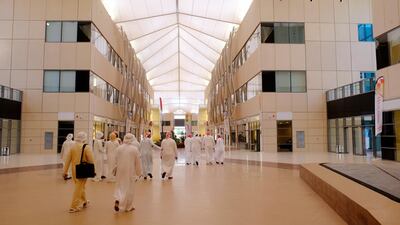Disruptive technologies are changing the way we plan for the future. As the UAE becomes a knowledge-based economy, jobs will soon be linked to an even greater extent to careers focused on science, technology, engineering and mathematics – the so-called Stem subjects. The 2020 Future of Jobs report by the World Economic Forum highlights that in the next five years, new jobs will be reserved for data analysts and scientists and software and applications developers.
The UAE government foresaw the importance of focusing its efforts on innovation and providing young people with opportunities to explore this and contribute to diversifying the economy. I also have my family to thank for encouraging me to pursue my passion. My father is an engineer and my mother studied IT, so I have always been surrounded by these conversations.
However, despite great efforts by families, the government, education providers and major employers, we need to do more to encourage our young people to remain engaged in science and technology. Children below the age of five can show signs of analytical thinking, and we need to nurture this skill early on.
The question is, how do we ensure that young people do not lose interest? How can we encourage them to continue embracing innovative thinking? I believe the key is to show them the fruits of their labours.
I learnt to invent with a purpose. For example, I visited Tawam Hospital in Abu Dhabi and noticed that children with cancer were unable to attend school. This inspired me to invent the “smart teleporter”, a robot that attends school on behalf of students and records classes for them – similar to remote learning.
The government, as well as entities such as the Mubadala Investment Company, have continued to nurture Emirati talent and prepare us to pursue careers in Stem subjects, which essentially are the building blocks for economic diversification.
The Abu Dhabi government has been instilling the importance of innovation in our youth through initiatives such as Hub71, a platform to attract foreign talent, and Cleveland Clinic Abu Dhabi’s junior caregiver programme, which helps drive interest in healthcare careers. Companies such as Emirates Global Aluminium, meanwhile, have been funding student research. By leveraging these resources, emerging national talents are being equipped to lead across innovative sectors in line with the Abu Dhabi 2030 Economic Vision.

In addition to increasing its efforts on preparing youth for tomorrow's world, the UAE is increasingly focusing on how innovation is changing the way we live and operate. This is one of the touchpoints of Mubadala's investigative documentary, Investing in innovation: the future is here, which I had the pleasure of hosting alongside prominent speakers such as Dr Sultan Al Jaber, Minister of Industry and Advanced Technology, and Waleed Al Mokarrab Al Muhairi, Mubadala's deputy group chief executive.
The documentary elaborates on Mubadala’s efforts, in parallel with our nation’s leadership and global partners, to help position the UAE as a hub for enhancing the global innovation ecosystem.
Throughout this experience, I sought to bring to light the challenges we face in these industries and how we are navigating them. I did this by interviewing some of Mubadala’s partners, including Kirsty Lloyd-Jukes, the investor relations principal at Waymo, an American autonomous driving technology development company. Ms Lloyd-Jukes described the machine-learning applications being utilised in building Waymo’s autonomous vehicles. I also spoke to Mark Gillett, the managing director of Silver Lake, about large-scale technology investing, how the firm identifies companies and technologies, and how disruption and technologies such as AI and cloud computing continue to change the way we work.
Clearly, inventing with purpose leads the younger generation to dream big. The UAE, for instance, is preparing to send the first female Arab astronaut to space. This is a perfect example of how moving the needle isn’t simply about reaching historical milestones but opening the doors for anyone to achieve their dreams.

There are many young Emirati women leading the way. Reem Al Marzouqi is an inventor and engineer who created a car that can be driven with one’s feet, and an interactive robot for children on the Autism spectrum. Roudha bin Baher is an engineer who was the only female to participate in the World Skills competition, in the refrigeration and air conditioning category. She also started a mentoring programme with Danfoss Engineering to promote female representation in the field.
These are only some of the role models to have guided me through some of the obstacles women typically encounter.
With all these remarkable achievements, there are still global challenges that must and can be overcome.
Whether international leaders introduce initiatives across schools, or tech companies establish programmes to provide school children with the tools to discover these fields, the global community must do more.
By continuing to invest in innovation and providing the younger generations with these resources, we will pave the way for young Emiratis to become the technology stars of the future.
The documentary will be live on the Mubadala website on June 23. For details, visit mubadala.com
Fatima Al Kaabi is an award-winning student who was recognised in 2015 as the youngest Emirati inventor. She is currently studying computer engineering at Virginia Tech University

